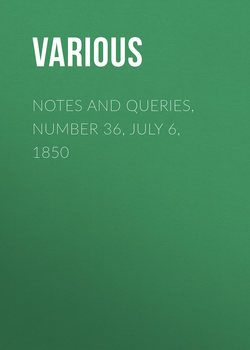Notes and Queries, Number 36, July 6, 1850

Реклама. ООО «ЛитРес», ИНН: 7719571260.
Оглавление
Various. Notes and Queries, Number 36, July 6, 1850
NOTES
FURTHER NOTES ON DERIVATION OF THE WORD "NEWS"
MORE BORROWED THOUGHTS
STRANGERS IN THE HOUSE OF COMMONS
FOLK LORE
THE HYDRO-INCUBATOR
ETYMOLOGY OF THE WORD "PARLIAMENT."
"INCIDIS IN SCYLLAM, CUPIENS VITARE CHARYBDIM."
A NOTE OF ADMIRATION!
THE EARL OF NORWICH AND HIS SON GEORGE LORD GORING
QUERIES
JAMES CARKASSE'S LUCIDA INTERVALLA, AN ILLUSTRATION OF PEPYS' DIARY
MINOR QUERIES
REPLIES
PUNISHMENT OF DEATH BY BURNING
TO GIVE A MAN HORNS
Replies to Minor Queries
MISCELLANIES
Miscellaneous
NOTES ON BOOKS, SALES, CATALOGUES, &c
BOOKS AND ODD VOLUMES
Notices to Correspondents
Отрывок из книги
Without being what the Germans would call a purist, I cannot deem it an object of secondary importance to defend the principles of the law and constitution of the English language. For the adoption of words we have no rule; and we act just as our convenience or necessity dictates: but in their formation we must strictly conform to the laws we find established. Your correspondents C.B. and A.E.B. (Vol. ii., p. 23.) seem to me strangely to misconceive the real point at issue between us. To a question by the latter, why I should attempt to derive "News" indirectly from a German adjective, I answer, because in its transformation into a German noun declined as an adjective, it gives the form which I contend no English process will give. The rule your correspondents deduce from this, neither of them, it appears, can understand. As I am not certain that their deduction is a correct one, I beg to express it in my own words as follows:—There is no such process known to the English language as the formation of a noun-singular out of an adjective by the addition of "s": neither is there any process known by which a noun-plural can be formed from an adjective, without the previous formation of the singular in the same sense; except in such cases as "the rich, the poor, the noble," &c., where the singular form is used in a plural sense. C.B. instances "goods, the shallows, blacks, for mourning, greens." To the first of these I have already referred; "shallow" is unquestionably a noun-singular; and to the remaining instances the following remarks will apply.
As it should be understood that my argument applies solely to the English language, I think I might fairly take exception to a string of instances with which A.E.B. endeavours to refute me from a vocabulary of a language very expressive, no doubt, yet commonly called "slang". The words in question are not English: I never use them myself, nor do I recognise the right or necessity for any one else to do so; and I might, indeed, deem this a sufficient answer. But the fact is that the language in some degree is losing its instincts, and liberties are taken with it now that it would not have allowed in its younger days. Have we not seen participial adjectives made from nouns? I shall therefore waive my objection, and answer by saying that there is no analogy between the instances given and the case in point. They are, one and all, elliptical expressions signifying "black clothes, green vegetables, tight pantaloons, heavy dragoons, odd chances," &c. "Blacks" and "whites" are not in point, the singular of either being quite as admissible as the plural. The rule, if it be worth while to lay down a rule for the formation of such vulgarisms, appears to be that characteristic adjective, in constant conjunction with a noun in common use, may be used alone, the noun being understood. Custom has limited in some measure the use of these abridged titles to classes or collective bodies, and the adjective takes the same form that the noun itself would have had; but, in point of fact, it would be just as good English to say "a heavy" as "the heavies" and they all become unintelligible when we lose sight of the noun to which they belong. If A.E.B. should assert that a glass of "cold without," because, by those accustomed to indulge in such potations, it was understood to mean "brandy and cold water, without sugar," was really a draught from some "well of purest English undefil'd," the confusion of ideas could not be more complete.
.....
"Noise" has never been used in the sense of the French word in this country. If derived immediately from the French, it is hardly probable that it should so entirely have lost every particle of its original meaning. With us it is either a loud sound, or fame, report, rumour, being in this sense rendered in the Latin by the same two words, fama, rumor, as News. The former sense is strictly consequential to the latter, which I believe to be the original signification, as shown in its use in the following passages:—
Ant. and Cleo., Act i. Sc. 2.
.....